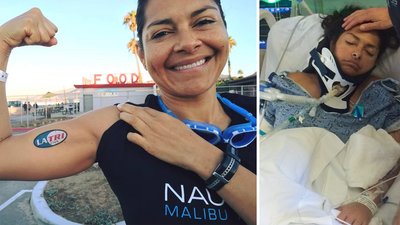You believe that you'll recognize the most important moment of your life while it's happening. But maybe it won't be what you expect. And maybe you won't realize its impact until after it occurs.
Katherine (Kat) Portillo earned a Master's degree in aeronautical science from Embry-Riddle Aeronautical University in December of 2011. She won an International Federation of Bodybuilding and Fitness (IFBB) pro card in June of 2012. Two and a half years later, in December of 2014, she married photographer Pavel Ythjall after a storybook romance and proposal. She was promoted to the rank of Major in the Air Force less than a year later, in June of 2015.
But, each of these takes a backseat to the most profound moment of her life.
On December 5, 2015, Kat found herself hanging upside down in her seat in her husband's Range Rover Sport after a dramatic rollover accident on the 405 freeway in Los Angeles.
She and Pavel had been on their way to a Christmas party in Laguna Niguel, California, but now she was unable to move—conscious, and not in a terrible amount of pain, but unable to unleash herself from her seat, suspended with her head toward the ground and her feet toward the sky within the vehicle.
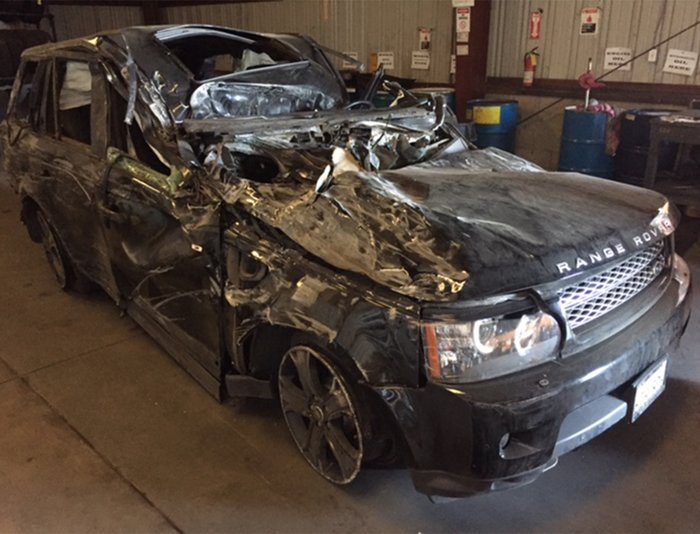
She thought her arms were either broken or numbed by the crash. Her eyes sought Pavel, who had unleashed himself from his own hanging seat and fallen through the windshield, onto the freeway. Their passenger cried in the back seat from pain.
Kat was confused, unsure of what had happened to her, or to any of them. She had been looking forward to the evening's Christmas party, a trivial event in the scheme of things, but this would indisputably become the most critical moment of her life.
Kat was left a quadriplegic, unable to move any of her limbs to this day.
The Drive to Succeed
Kat served for 18 years on active duty before the accident, most recently positioned as a Deputy Branch Chief at the Space Superiority Directorate in Los Angeles, although due to her accident, she was forced to retire two years shy of her twenty-year service goal.
While in the military, she ran marathons, competed in a 100-mile bike race and a few sprint triathlons, and even did the Malibu Olympic-Distance Triathlon, comprising a 1.5K swim in the Pacific Ocean, a 40K bike course along the Pacific Coast Highway, and a 10K run along Zuma Beach.
She liked doing the races, but didn't like the scrawny look it gave her, so Kat started training with weights to increase her muscle mass. She attended a couple of National Physique Committee (NPC) shows as a spectator and began to dream of getting her IFBB pro card. She competed in bikini competitions, winning first place, and received that pro card in 2012 at the NPC Junior National Championships in Chicago.

At a dinner after a fitness event in Los Angeles, Kat met her husband, Pavel, a fitness photographer she instantly connected with. By the end of their meal, he'd fallen asleep on her arm.
She had no idea that she would marry him, and that he would be like this all the time, falling asleep on her wherever they went, but Kat's drive for fitness had driven her toward her love.
A Bump in the Road
On the way to the Christmas party on the evening of the crash, Pavel and Kat stopped to pick up their passenger, Elizabeth, in Lakewood, then re-entered the 405 freeway heading south as Kat began searching her iPhone to play Christmas music, an enhancement to their already festive mood.
"That's my last memory before the accident," she says. These are the small details that sear into your brain during life's most important moments—scrolling on a phone, or other small actions taken for granted, performed on autopilot thousands of times in your life.
Any one of them only stands out later, after a momentous or portentous occasion, and Kat remembers several of these from this ill-fated trip while those from other drives along the 405 have blurred into nothingness.
Neither Pavel nor Kat know what their car hit: something on the road large enough to launch the vehicle into a rollover collision, as Pavel grasped the steering wheel, unable to right the car.
"While it was happening, I thought we'd be okay," Kat says, "because I was conscious throughout."
The Range Rover careened into a light post and Kat felt her head snap back against the car seat. "But I didn't think much of it at the time," she says.
Pavel's head smashed into the driver's side window, fracturing his skull and his C1 vertebrae. Then everything went black for Pavel. When he came to moments later, he could hear their passenger, Elizabeth, crying in the backseat, and the vehicle was upside down on its roof.
Although Kat was unable to release herself from her seat, Pavel believes that his wife's Air Force training helped save them all. "Go get help!" she called, unable to move.
Pavel unleashed himself from his seat, falling onto the roof and out of the smashed vehicle. Only when he was outside did he recognize that he had an enormous gash on his arm and that his head was bleeding profusely.
"Elizabeth tossed me her purse," he says, "And I tried to search through it for a phone, but I couldn't remember what a phone looked like."
Desperately injured, he walked along the freeway waving his hands as cars honked and vehicle after vehicle passed, ignoring him.
Finally, Pavel stopped a car on the off ramp and the two women inside called for emergency services.
Neither Pavel nor Kat can remember how long it took for help to arrive, but they finally heard sirens blaring in the distance.
Flight to Safety
Kat was born in Belize in 1978. Her mother's boyfriend put his name on her birth certificate, even though the "parents" had met after Kat's mother was already pregnant. Their relationship did not last, and Kat remembers having a difficult, abuse-filled childhood. Perhaps because of this abuse, Kat became rebellious, moving between her biological mother and adoptive parents in America, a short-lived situation.
Eventually, she turned to exercise. "In the midst of chaos, exercising was something I could control. It empowered me, boosted my confidence, and provided therapy while I was battling depression," she says.
Since her mother's previous boyfriend was an American and his name was on her birth certificate, Kat was also allowed American citizenship and began the process of joining the Air Force when she was 17 years old.
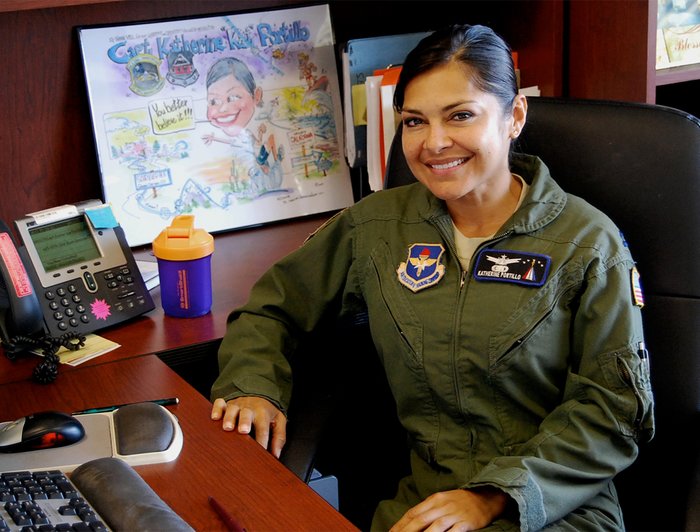
She relocated to Houston and remembers being amazed at how many lanes of traffic there were.
"I was depressed because I was away from my friends and what I knew as home," she says. "But once I joined the military and started building friendships, I started to feel like America was home."
The Route to Recovery
Still hanging upside down in her seat, Kat prayed that the ambulances she could hear in the distance were coming to save them.
"When the EMTs arrived, they did their best to protect me," she says.
They cut her seatbelt and eased her from the car, but the crash had fractured Kat's C4 and C5 vertebrae, which punctured her spinal cord and instantly paralyzed her from the upper chest down, including her arms. In addition, she had open fractures in her left lower leg, which was broken in eight different places.
Doctors performed a 12-hour surgery, fusing the C3 to the C6 vertebrae, and also performed a tracheostomy to allow Kat to maintain an intake of air. A feeding tube was inserted to allow for the flow of nutrition.
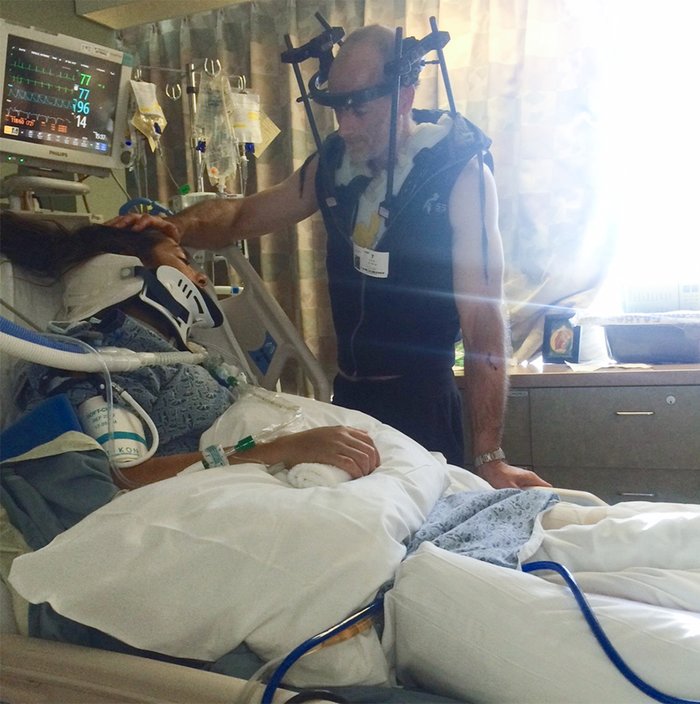
As a result of her paralysis, Kat had neurogenic bowel and bladder dysfunction, meaning she needed catheters to relieve her bladder and enemas to have bowel movements. Also, her body could no longer regulate its temperature, and she suffered from neuropathic pain. Pavel and the rest of Kat's family were told that Kat's chance of survival was approximately 10 percent.
But Kat didn't know about any of this, she says, until approximately a week later. She explains, "When I woke up, I panicked, wondering what had happened to my husband."
When he walked into Kat's ICU room with a halo brace screwed into his skull and shoulders, allowing him to recover from his fractured C1 spinal vertebrae, she felt a huge relief. Pavel had survived their wreck, which was Kat's primary concern.
Wrapped up in worry for him, she hadn't yet known what her own fate would be.
"When I was told that I was paralyzed from my shoulders down, it didn't register," she says. "I thought it would just take some time to heal. I talked to my friends in the Air Force, telling them I'd need some time off, but that I'd back to work soon. I still didn't understand my prognosis at that time. I was in complete denial."
The Path to Acceptance
Pavel had a broken neck and skull, and was in what he calls, "sick pain," begging for morphine and yet vomiting his meds. But repeating a mantra, "I have to be strong for Kat," was how he persevered.
The doctors had told him that Kat would likely be paralyzed for life. She spent five weeks in the Intensive Care Unit fighting pneumonia, and she couldn't speak for the first few weeks. As she recovered, her medical team began to wean her off the ventilator that had been allowing her to breathe. Her extreme level of pre-accident fitness helped in her recovery, she says, while teaching herself to breathe again.
"It was frightening, not being able to fully control my breathing. I had to close my eyes and think about inhaling and exhaling the way I had while I was lifting weights," she says.
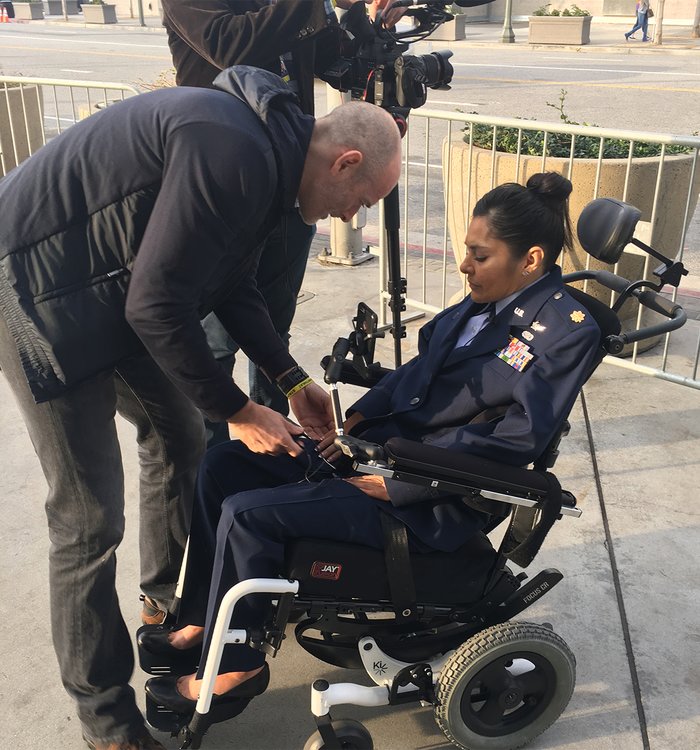
After a couple weeks, she stopped using the ventilator, an accomplishment and gift that so many people with her level of injury aren't afforded, she says.
Prior to her accident, Kat had been looking forward to serving in the military for at least two more years.
"I had hoped that I could still serve, based on my strongest asset—my sound mind," she says.
But, after two years of appealing a recommendation to be discharged, Kat finally came to terms with the military's assessment, leaving the institution she had served for half of her life, grateful for the experiences, knowledge, and extended family she gained through her time in that service.
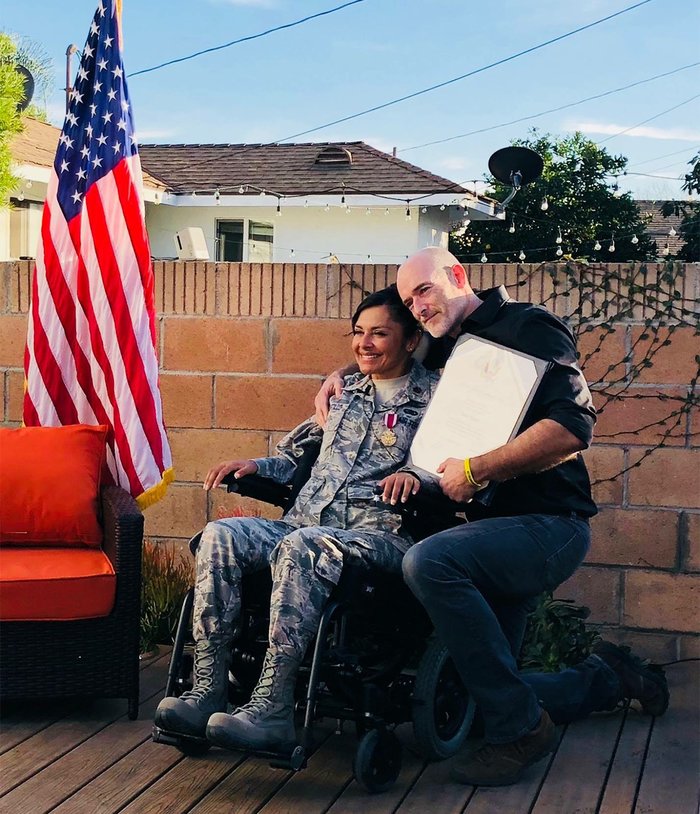
Kat was discharged from the Air Force on January 24, 2018, with honors. General Philip Garrant and approximately 70 Airmen from Kat's Los Angeles base attended the discharge ceremony in her jam-packed, home garden in Hawthorne, California.
While Kat has military benefits and medical care for the rest of her life, the crucial 24/7 nursing care she needs isn't covered—and it runs upward of $120,000 a year.
They reduce the expense by relying on friends, volunteer caregivers, and their fundraising efforts via "Strong with Kat."
Rockin' and Rollin'
On June 1, 2018, Pavel and Kat ran in the Rock 'n' Roll 5K in San Diego. This event was established to allow people who were not able to run themselves participate in an athletic event.
Pavel pushed Kat through the 5K event on an apparatus called "The Blade," allowing her to experience a semblance of the competition she'd know all her life.
Colonel Wasson, one of Kat's commanders, had sent a YouTube video of renowned athlete, Dick Hoyt, and his son Rick, who has cerebral palsy, participating in triathlons, with Dick pulling his son in seats during the swimming and bicycling portions of these events, which inspired Kat and Pavel to participate in the Rock 'n' Roll run.
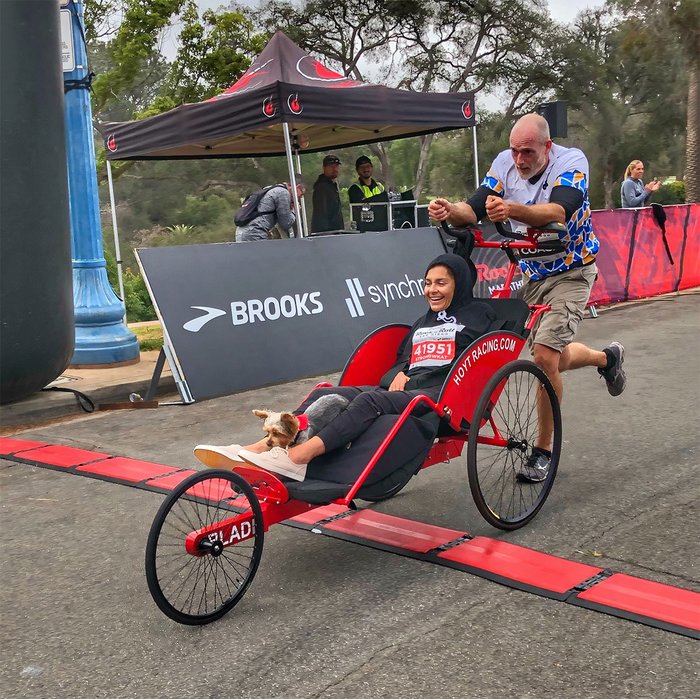
But it's not cheap to participate in these events. Specialized equipment is needed for the incapacitated loved one, so Pavel contacted Team Hoyt in San Diego, and they helped him to raise $6,000 for Kat's custom-made Blade in record time, shipped in for her 40th birthday
Before the race began, the emotions coursing through Kat were conflicted. Simply to be there, to be alive, was an amazing accomplishment. At the same time, she'd once stood at the starting line among runners who weren't physically challenged, ready to push herself. Today, she would be relying on her husband to cover the 5 kilometers for them both.
For Pavel's part, this was another step in supporting Kat's journey and in exorcising his own personal demons, those that had haunted him since their fateful evening on the 405. He ran the race at a pace of 8 minutes per mile, a blistering time for a 48-year-old man pushing his wife, with her small dog sitting on the Blade, as well.
Pavel pushed Kat across the finish line to the clapping hands of bystanders. In that moment, the emotions for both were overwhelming.
"Fuck death," Pavel recalls thinking to himself. "We're still here."

